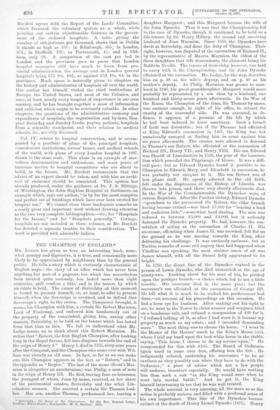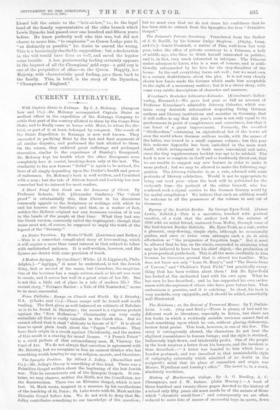THE CHAMPION OF ENGLAND.* MR. LoinIE ]:as given us here
an interesting book, some- what gossipy and digressive, it is true, and occasionally more likely to be appreciated by neighbours than by the general public. lie tells a story which is curiously characteristic of English ways,—the story of an office which has never been anything but part of a pageant, but which has nevertheless been treated quite seriously, has lasted more - than eight centuries, still confers a title, and is the tenure by which an estate is held. The owner of Scrivelsby at this moment is bound to present himself, or, at least, to offer to present himself, when the Sovereign is croensed, and to defend that Sovereign's right to the crown. The Conqueror brought, it seems, his Champion with him, a certain Sir Robert Marmion, Lord of Fontenay, and endowed him handsomely out of the property of the vanquished, giving him, among other manors, Scrivelsby, to be held on the tenure which has lasted from that time to this. We fail to understand what Mr. Lodge means us to think about this Robert Marmion. He writes that" Robert, the first English Champion, after basking long in the Royal favour, fell into disgrace towards the end of the reign of Henry I." Henry I. died in 1135, sixty-nine years after the Conquest, and the Champion who came over with Wil- liam was already an old man. In fact, as far as we can make out, this Champion appears in the text as "Robert," and in the appendix as " Rogier." The last of the name (Scott's Mar- mien is altogether an anachronism) was Philip, a man of note in the reign of Henry III. He died, leaving four co-heiresses, the youngest of whom, Joan by name, received, as her share of the patrimonial estates, Scrivelsby and the other Lin- colnshire manors. She married a certain Sir Thomas Lud- low. Her son, another Thomas, predeceased her, leaving a
* &rig:el:44 : the Hone of tho Cliampiono. By the Rev. Samuel Lodge.
London Stook ; Horrluodlo W. K. Morton. 1893. daughter Margaret ; and this Margaret became the wife of Sir John Dymoke. Thus it was that the Championship fell to the race of Dymoke, though it continued to be held on a life-tenure by Sir Henry Hillary, the second and surviving husband of Joan Marmion. Since 1350, the Dymokes have dwelt at Scrivelsby, and done the duty of Champion. Their right, however, was disputed at the coronation of Richard II., by the representative of Mazera Marmion, the eldest of the three daughters that left descendants, the claimant being Sir Baldwin Neville. The tenure of Scrivelsby, however, was held to carry with it the Championship, and Sir John Dymoke officiated at the coronation. Mr. Lodge, by the way, describes him on p. 48 as his wife's deputy, and on p. 49 as his mother's deputy. As Philip Marmion was grown to man- hood in 1240, his great-granddaughter Margaret would more probably be represented by a son than by a husband, one hundred and thirty-seven years afterwards. In the War of the Roses, the Champion of the time, Sir Thomas by name, was eminent enough, in right of his office, to attract the enmity of the successful side. He was executed, in de- fiance, it appears, of a promise of his life by which he had been induced to leave sanctuary. Such a breach of faith was detestable ; but if Sir Thomas had officiated at King Edward's coronation in 1461, the King was not unnaturally -annoyed at finding him in arms against him six years afterwards. The estates were allowed to descend to Thomas's son Robert, who officiated at the coronation of Richard III., Henry VII., and Henry VIII. His son Edward was Sheriff of Lincolnshire in 1536, the year of the insurrec- tion which preceded the Pilgrimage of Grace. It was a diffi- cult part; but as Edward Dymoke found it possible to be Champion to Edward, Mary, and Elizabeth in succession, he was probably not unequal to it. His son Robert was of less pliant stuff. He openly adhered to the old faith, fell under the displeasure of the Bishop of Lincoln, was thrown into prison, and there very shortly afterwards died. In the War of the Commonwealth, the Dynsokes were, of course, Royalists. After the Puritan victory, Edward Dymoke —grandson to the persecuted Sir Robert, the elder branch having become extinct—was fined £7,000 for " bearing a loud and malicious title,"—some what _hard dealing. The sum was reduced to between £5,000 and £4,000, but it seriously damaged the Dymoke property. He had, however, the con- solation of acting at the coronation of Charles II, His successor, officiating when James II. was crowned, fell fiat on the ground as he was moving towards the King, after delivering his challenge. It was curiously ominous ; but as Tacitus remarks of some evil augury that had happened when Vitellius was speaking, the most sinister omen of all was James himself, with all the Stuart folly aggravated to its height. In 1760, the direct line of the Dymokes expired in the person of Lewis Dymoke, who died unmarried at the age of ninety-two. Looking about for his next of kin, he pitched upon the younger branch—a choice which led to not a little trouble. His successor died in the same year; but the successor's son officiated at the coronation of George III. He left what it is much to be wished his predecessors had done,—an account of his proceedings on this occasion. He had a keen eye for business. After making out his right to act, he went to the Tower to claim armour and weapons, tried on a handsome suit, and refused a composition of £60 for it.
"I refused talking of it, as after I bad worn it, it became my property as much as my estate ; and I intended demanding more." The next thing was to choose the horse. "I went in the Master of the Horses' coach to the King's Meuse (sic), where I laid my hand upon the best white horse in the stable, saying, This horse I choose to do my service upon.' " He compounded for this with £105. The Board of Ordnance again tried to come over him, offering him the £60. He indignantly refused, cautioning his successors " to be as cautious as they possibly can when they have to do with the Ordnance ;" a piece of advice which not a few people will endorse, inventors especially. He would have nothing less than such a suit "as the King would wear when he went into, mortal battle." And he got it, the King himself intervening to see that he was well treated.
The whole account is very amusing, all the more so as the writer is perfectly serious, and filled with a profound sense of his own importance. This line of the Dymokes became extinct at the death of Henry Lionel Dymoke (1875). Henry Lionel left the estate to the "heir-at-law," i.e., to the legal head of the family representative of the elder branch which Lewis Dymoke had passed over one hundred and fifteen years before. He knew perfectly well who this was, but did not choose to name him, "to emphasise" as Canon Lodge puts it, "as distinctly as possible" his desire to amend the wrong. This is a becomingly charitable supposition ; but a declaration in the will would have done as well, and saved the legatee some trouble. A less praiseworthy feeling certainly appears in the bequest of all the Champions' gold cups—a gold cup is one of the perquisites of office—to the Queen. Happily, her Majesty, with characteristic good feeling, gave them back to the family. This, in. brief, is the story of the Dymokes, " Champions of England."



















































 Previous page
Previous page